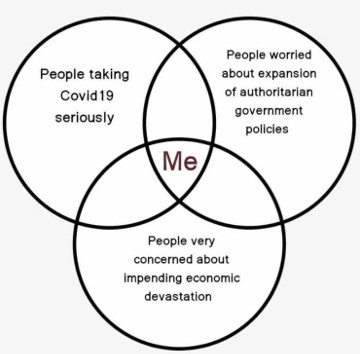Hashtags of Refusal
This post was written 5 years ago.
Fri, 30 Apr 2021
Today I have been in Germany for two weeks. When I arrived, the UK was a risk area, within two days from my arrival that classification was dropped.
But what was happening in Germany was more important. On Wednesday April 21, a new law was passed, an update to the so-called infection protection law (Infektionsschutzgesetz), or “emergency brake” (Notbremse). The bewilderment this law has left me with, is hard to put into words. The latest in a series of attacks on fundamental rights, it demolishes people's freedom in ways that nothing has come close to in the history of the federal republic. And in fact, much of federalism is suspended for the duration of the epidemic situation of national concern (epidemische Lage nationaler Tragweite).
The law pretends to be rooted in science, but this science is complete bollocks. Since the beginning of the crisis, Germans have been looking at the Inzidenzwert, which simply means the number of positive corona PCR tests per 100 000 inhabitants, within a week. This is an absolute number, not the ratio of positive tests per total. If you test more you will get more incidences, if you have a low prevelance of the disease in the population, almost all positives will be false positives.
Now, the law says this — and it applies nationwide: When in a region the incidence is above 100, a curfew will be placed on this region each night from 10pm to 5am — but you are allowed to go jogging till midnight, but only on your own, hahah, how generous. Also, during the day you can only meet up with one person from a different household. Hospitality is closed, all cultural live is shut down (cinema, theatre, concerts), no team sports allowed. Schools close when the incidence is above 165.
The parliament approved, and a sizeable part of the population seems to agree with these regulations, something I just do not understand. — Though I am having my doubts whether this part of the population is as big as government and media want to make us believe.
The day after the law was passed, something great happened. A number of Germany's most revered and popular actors plus some less well-known ones, 53 altogether, published short Youtube videos. In these videos, they were using satire to highlight the plight of people affected by the lockdown, the disproportionateness of the measures, and the ceaseless alarmist reporting by the media. Artists had been so quiet up till then, and finally they were daring to object. They used the hashtag #allesdichtmachen — shut everything down. The pieces were really well-written and beautifully produced and acted. They will be the perfect documentation of this crazy time. And they hit home.
They hit home so much that the powers that be had to immediately raise hell and hit back with a cacaphony of angry and outraged voices. How could they? The actors were serving the narratives of the far right!! (never mind they were clearly mostly left-leaning people; funnily, two of the videos had addressed exactly this topic — people being accused of “receiving applause from the wrong side”). How disgusting! Apparently, they were making fun of people working in intensive care (no reference to that whatsoever in the videos), the victims of the pandemic, and people who were scared. A veritable shitstorm broke loose on Twitter and an official of a broadcast channel called for the actors not to be given any roles anymore, then later deleted the tweet. Some of the actors were threatened and in the end a number of them withdrew their videos. By now, there are just 29 left.
This is called freedom of speech. This is called artistic freedom. This is called a democracy.
What has happened to my country? What has happened to the world?
I will not make it a secret anymore how opposed I am to all this shit, and how little I believe in the official narrative. This has reached levels that would be comical if it wasn't so serious.
There is another hashtag that precedes #allesdichtmachen, and I had wanted to write about it for a bit.
It originated from a video published by philosoper, writer and youtuber Gunnar Kaiser. Until recently he had been working as a teacher, but when after the Easter holidays, pupils were forced to test themselves twice a week at school for Covid (and then, even when negative, still had to wear masks; when positive had to be immediately isolated, which would likely fill them with shame), he decided to quit. In the video he repeatedly says, “I am not taking part in this”, “Ich mach da nicht mit”. Other people picked it up and gave their reasons for not taking part anymore (and the not taking part could refer to different things, but was usually to do with the rules around Covid), so it became the hashtag #ichmachdanichtmit. There are many many brilliant Youtube and Instagram videos, and texts.
This will be a first, I am going to write in German on this blog. I have been meaning to do my own version of #ichmachdanichtmit for a while.
#ichmachdanichtmit
Ich mach da nicht mit. Ich weigere mich. Ich sage Nein.
Ich mach da nicht mit. Ich lasse mich nicht in Angst versetzten von verzerrten, überzogenen und teils manipulierten Medienberichten. Ich lasse mich nicht beunruhigen von diesem Dauerbombardement mit Horror-Geschichten.
Ich sage Nein zu einer Wissenschaft, die keine Wissenschaft mehr ist, sondern Religion. Denn was anderes ist eine Wissenschaft der man den Diskurs nimmt? Eine Wissenschaft, bei der man vielen ihrer angesehensten, verdientesten Mitglieder die Teilnahme an der Diskussion versagt. Und nicht nur das, sie werden diffamiert und mit angeblichen “Faktenchecks” diskreditiert, die so unhaltbar sind, dass es zum Himmel schreit.
Ich sage Nein zu den Hohepriestern und ihrer Gefolgschaft, die angebliche wissenschaftliche Wahrheiten verkünden, welche auf zweifelhaften und niemals vorher so eingesetzten Mitteln der Diagnostik und Datenerhebung basieren.
Ich mach da nicht mit. Ich werde niemals glauben, dass es Kindern nichts ausmacht im Unterricht Masken zu tragen, nur weil man mir sagt “die Kinder machen das total gut mit, sie machen es besser als ich”. Ich werde niemals verstehen, wie diese Maßnahme so schnell, ohne wirkliche Prüfung, ohne wirkliche Evidenz ihres Nutzens und ihrer Schadlosigkeit umgesetzt werden konnte, und dass es so wenig Widerstand dagegen gab. Ich werde nie glauben, dass davon kein Schaden ausgeht.
Ich mach da nicht mit. Ich werde niemals akzeptieren dass die Lockdowns in dieser Krise ein adäquates Mittel gewesen sein sollen das Virus einzudämmen, während es genug weniger destruktive Gegenvorschläge gab, einschließlich der Empfehlungen der WHO zur Eindämmung von Grippe-Edpidemien. Ich werde niemals glauben, dass der Nutzen von Lockdowns auch nur annähernd den Schaden aufwiegt, der dadurch verursacht wurde.
Ich sage Nein zu einer Strategie, die nur auf das Überleben abziehlt, aber dabei das Leben verneint.
Ich sage Nein zu einem Leben ohne Kunst, ohne Live-Musik, ohne Theater und spontane Versammlungen von Menschen.
Ich sage Nein zu einem Umbau der Gesellschaft, der vordergründig mehr Sicherheit und Bequemlichkeit bietet. Aber “wer für die Sicherheit die Freiheit aufgibt, verliert am Ende beides”.
Ich sage Nein zu einer experimentellen gen-basierten Impfung, die jetzt schon ihre Gefährlichkeit zeigt, und auf der trotzdem weiter beharrt wird, und die Bedingung für den Zugang zu bestimmten Leistungen werden soll.
Ich mach da nicht mit. Ich sage Nein zu psychologischer Manipulation, zum Schüren von Angst im Namen der Besorgnis dass die Menschen sonst nicht “das Richtige tun”, nicht gehorchen.
Ich sage Ja zum Ungehorsam in einem kranken System.
Ich sage Ja zum Hören und Anhören von verschiedenen Meinungen.
Ich sage Ja zur eigenen Mündigkeit und zu einem möglichst selbstbestimmten Leben.
Ich sage Ja zu Fröhlichkeit, Humor, Mitgefühl und Freundlichkeit, Liebe zum Leben und zu den Menschen.
Nachtrag: Dies ist spontan heruntergeschrieben, ich denke es ist ein Ausgangspunkt, auch um zu konstruktiven Beiträgen in dieser Krise zu kommen — hoffentlich demnächst auch auf diesem Blog. Aber zu wissen wo man nicht hinwill ist auch wichtig.
But what was happening in Germany was more important. On Wednesday April 21, a new law was passed, an update to the so-called infection protection law (Infektionsschutzgesetz), or “emergency brake” (Notbremse). The bewilderment this law has left me with, is hard to put into words. The latest in a series of attacks on fundamental rights, it demolishes people's freedom in ways that nothing has come close to in the history of the federal republic. And in fact, much of federalism is suspended for the duration of the epidemic situation of national concern (epidemische Lage nationaler Tragweite).
The law pretends to be rooted in science, but this science is complete bollocks. Since the beginning of the crisis, Germans have been looking at the Inzidenzwert, which simply means the number of positive corona PCR tests per 100 000 inhabitants, within a week. This is an absolute number, not the ratio of positive tests per total. If you test more you will get more incidences, if you have a low prevelance of the disease in the population, almost all positives will be false positives.
Now, the law says this — and it applies nationwide: When in a region the incidence is above 100, a curfew will be placed on this region each night from 10pm to 5am — but you are allowed to go jogging till midnight, but only on your own, hahah, how generous. Also, during the day you can only meet up with one person from a different household. Hospitality is closed, all cultural live is shut down (cinema, theatre, concerts), no team sports allowed. Schools close when the incidence is above 165.
The parliament approved, and a sizeable part of the population seems to agree with these regulations, something I just do not understand. — Though I am having my doubts whether this part of the population is as big as government and media want to make us believe.
The day after the law was passed, something great happened. A number of Germany's most revered and popular actors plus some less well-known ones, 53 altogether, published short Youtube videos. In these videos, they were using satire to highlight the plight of people affected by the lockdown, the disproportionateness of the measures, and the ceaseless alarmist reporting by the media. Artists had been so quiet up till then, and finally they were daring to object. They used the hashtag #allesdichtmachen — shut everything down. The pieces were really well-written and beautifully produced and acted. They will be the perfect documentation of this crazy time. And they hit home.
They hit home so much that the powers that be had to immediately raise hell and hit back with a cacaphony of angry and outraged voices. How could they? The actors were serving the narratives of the far right!! (never mind they were clearly mostly left-leaning people; funnily, two of the videos had addressed exactly this topic — people being accused of “receiving applause from the wrong side”). How disgusting! Apparently, they were making fun of people working in intensive care (no reference to that whatsoever in the videos), the victims of the pandemic, and people who were scared. A veritable shitstorm broke loose on Twitter and an official of a broadcast channel called for the actors not to be given any roles anymore, then later deleted the tweet. Some of the actors were threatened and in the end a number of them withdrew their videos. By now, there are just 29 left.
This is called freedom of speech. This is called artistic freedom. This is called a democracy.
What has happened to my country? What has happened to the world?
I will not make it a secret anymore how opposed I am to all this shit, and how little I believe in the official narrative. This has reached levels that would be comical if it wasn't so serious.
There is another hashtag that precedes #allesdichtmachen, and I had wanted to write about it for a bit.
It originated from a video published by philosoper, writer and youtuber Gunnar Kaiser. Until recently he had been working as a teacher, but when after the Easter holidays, pupils were forced to test themselves twice a week at school for Covid (and then, even when negative, still had to wear masks; when positive had to be immediately isolated, which would likely fill them with shame), he decided to quit. In the video he repeatedly says, “I am not taking part in this”, “Ich mach da nicht mit”. Other people picked it up and gave their reasons for not taking part anymore (and the not taking part could refer to different things, but was usually to do with the rules around Covid), so it became the hashtag #ichmachdanichtmit. There are many many brilliant Youtube and Instagram videos, and texts.
This will be a first, I am going to write in German on this blog. I have been meaning to do my own version of #ichmachdanichtmit for a while.
#ichmachdanichtmit
Ich mach da nicht mit. Ich weigere mich. Ich sage Nein.
Ich mach da nicht mit. Ich lasse mich nicht in Angst versetzten von verzerrten, überzogenen und teils manipulierten Medienberichten. Ich lasse mich nicht beunruhigen von diesem Dauerbombardement mit Horror-Geschichten.
Ich sage Nein zu einer Wissenschaft, die keine Wissenschaft mehr ist, sondern Religion. Denn was anderes ist eine Wissenschaft der man den Diskurs nimmt? Eine Wissenschaft, bei der man vielen ihrer angesehensten, verdientesten Mitglieder die Teilnahme an der Diskussion versagt. Und nicht nur das, sie werden diffamiert und mit angeblichen “Faktenchecks” diskreditiert, die so unhaltbar sind, dass es zum Himmel schreit.
Ich sage Nein zu den Hohepriestern und ihrer Gefolgschaft, die angebliche wissenschaftliche Wahrheiten verkünden, welche auf zweifelhaften und niemals vorher so eingesetzten Mitteln der Diagnostik und Datenerhebung basieren.
Ich mach da nicht mit. Ich werde niemals glauben, dass es Kindern nichts ausmacht im Unterricht Masken zu tragen, nur weil man mir sagt “die Kinder machen das total gut mit, sie machen es besser als ich”. Ich werde niemals verstehen, wie diese Maßnahme so schnell, ohne wirkliche Prüfung, ohne wirkliche Evidenz ihres Nutzens und ihrer Schadlosigkeit umgesetzt werden konnte, und dass es so wenig Widerstand dagegen gab. Ich werde nie glauben, dass davon kein Schaden ausgeht.
Ich mach da nicht mit. Ich werde niemals akzeptieren dass die Lockdowns in dieser Krise ein adäquates Mittel gewesen sein sollen das Virus einzudämmen, während es genug weniger destruktive Gegenvorschläge gab, einschließlich der Empfehlungen der WHO zur Eindämmung von Grippe-Edpidemien. Ich werde niemals glauben, dass der Nutzen von Lockdowns auch nur annähernd den Schaden aufwiegt, der dadurch verursacht wurde.
Ich sage Nein zu einer Strategie, die nur auf das Überleben abziehlt, aber dabei das Leben verneint.
Ich sage Nein zu einem Leben ohne Kunst, ohne Live-Musik, ohne Theater und spontane Versammlungen von Menschen.
Ich sage Nein zu einem Umbau der Gesellschaft, der vordergründig mehr Sicherheit und Bequemlichkeit bietet. Aber “wer für die Sicherheit die Freiheit aufgibt, verliert am Ende beides”.
Ich sage Nein zu einer experimentellen gen-basierten Impfung, die jetzt schon ihre Gefährlichkeit zeigt, und auf der trotzdem weiter beharrt wird, und die Bedingung für den Zugang zu bestimmten Leistungen werden soll.
Ich mach da nicht mit. Ich sage Nein zu psychologischer Manipulation, zum Schüren von Angst im Namen der Besorgnis dass die Menschen sonst nicht “das Richtige tun”, nicht gehorchen.
Ich sage Ja zum Ungehorsam in einem kranken System.
Ich sage Ja zum Hören und Anhören von verschiedenen Meinungen.
Ich sage Ja zur eigenen Mündigkeit und zu einem möglichst selbstbestimmten Leben.
Ich sage Ja zu Fröhlichkeit, Humor, Mitgefühl und Freundlichkeit, Liebe zum Leben und zu den Menschen.
Nachtrag: Dies ist spontan heruntergeschrieben, ich denke es ist ein Ausgangspunkt, auch um zu konstruktiven Beiträgen in dieser Krise zu kommen — hoffentlich demnächst auch auf diesem Blog. Aber zu wissen wo man nicht hinwill ist auch wichtig.
This post was written 5 years ago, which in internet time is really, really old. This means that what is written above, and the links contained within, may now be obsolete, inaccurate or wildly out of context, so please bear that in mind :)



